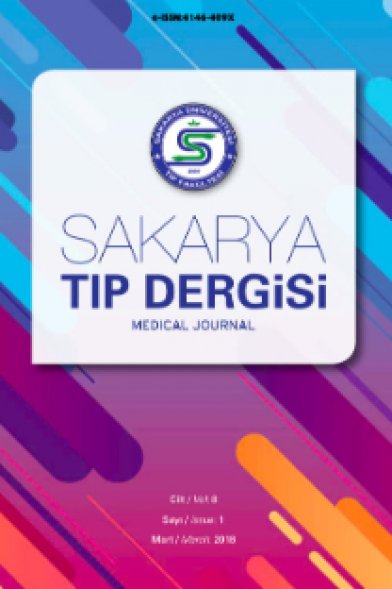Sağlıklı ve Çölyak Hastalığı Tanısı ile İzlenen Adölesanlarda Psikiyatrik Özellikler ve Aile İşlevselliğinin Karşılaştırılması
Adölesan, Çölyak Hastalığı
Comparasion of Psychiatric Features and Family Functioning in Adolescents with Celiac and Healthy Adolescents
Adolescents, Celiac Disease,
___
- Referans 1. Maki M, Mustalathi K, Kokkonen J, Kulmala P, Haapalahti M, Karttunen T, et al. Prevalence of celiac disease among children in Finland. N Engl J Med 2003; 19: 2517-24.
- Referans 2. Dalgic B, Sari S, Basturk B, Ensari A, Egritas O, Bukulmez A, et al. Prevalence of celiac disease in healthy Turkish school children. Am J Gastroenterol 2011; 106: 1512-7.
- Referans 3.Almallouhi E, King KS, Patel B, Wi C, Juhn YJ, Murray JA, Absah I. Increasing incidence and altered presentation in a population-based study of pediatric celiac disease in North America. J Pediatr Gastroenterol Nutr 2017; 65: 432–437.
- Referans 4.Csizmadia CG, Mearin ML, von Blomberg BME, Brand R, Verloove-Vanhorick SP. An iceberg of childhood coeliac disease in the Netherlands. Lancet 1999; 353: 813–814.
- Referans 5. Rubio-Tapia A, Hill ID, Kelly CP, Calderwood AH, Murray JA; American College of Gastroenterology. ACG clinical guidelines: diagnosis and management of celiac disease. Am J Gastroenterol 2013; 108: 656-76.
- Referans 6. Aydogdu S, Midyat L, Cakir M, Tumgor, Yuksekkaya HA, Baran M, et al. Long-term effect of gluten-free diet on growth velocity in Turkish children with celiac disease. Dig Dis Sci 2009; 54: 2183-7.
- Referans 7. Fabiana Z, Gillian LS, Timothy RC, David SS, Jonas FL, Julio CB. Psychological morbidity of celiac disease: A review of the literatureUnited European Gastroenterology Journal 2015; 3: 136–145.
- Referans 8. Hernanz A, Polanco I. Plasma precursor amino acids of central nervous system, monoamines in children with coeliac disease. Gut. 1991; 32: 1478-81.
- Referans 9. Beck AT, Ward C, Mendelson M. Beck depression inventory (BDI). Arch Gen Psychiatry 1961; 4: 561-71.
- Referans 10. Hisli-Sahin N. A study on the validity of Beck Depression Inventory. Turkish Journal of Psychology 1988; 6: 118-126.
- Referans 11. Goodman R. The strengths and difficulties questionnaire: A research note. JJ Child Psychol Psychiatry 1997; 38: 581-586.
- Referans 12. Güvenir T, Özbek A, Baykara B, Arkar H, Şentürk B, İncekaş S. Psychometric Properties of The Turkish Version of The Strengths and Difficulties Questionnaire (SDQ). Turk J Child Adolesc Ment Health.2008; 15: 65-74.
- Referans 13. Epstein NB, Baldwin LM, Bishop DS. The McMaster family assessment device. Journal of marital and family therapy, 1983; 9: 171-180.
- Referans 14.Bulut, I. Family assessment scale handbook. Ankara: Ozguzelis Printing House,1990: p. 6-8.Referans 15. Hallert C, Astrom J and Sedvall G. Psychic disturbances in adult coeliac disease. Scand J Gastroenterol 1982; 17: 25–28.
- Referans 16. Nachman F, del Campo MP, Gonza´ lez A, Corzo L, Vazquez H, Sfoggia C, et al. Longterm deterioration of quality of life in adult patients with celiac disease is associated with treatment noncompliance. Dig Liver Dis 2010; 42: 685–691.
- Referans 17. Addolorato G, De Lorenzi G, Abenavoli L, Leggio L, Capristo E, Gasparrini G, et al. Psychological support counselling improves gluten-free diet compliance in coeliac patients with affective disorders. Aliment Pharmacol Ther. 2004; 20: 777–782.
- Referans 18. Fera T, Cascio B, Angelini G, Martini S, Guidetti CS. Affective disorders and quality of life in adult coeliac disease patients on a gluten-free diet. Eur J Gastroenterol Hepatol. 2003; 15: 1287–1292.
- Referans 19. Van Hees NJ, Van der Does W and Giltay EJ. Coeliac disease, diet adherence and depressive symptoms. J Psychosom Res 2013; 74: 155–160.
- Referans 20. Potocki P, Hozyasz K. Psychiatric symptoms and coeliac disease. Psychiatr Pol. 2002; 36: 567-78.
- Referans 21. Cossu G, Carta MG, Contu F, Mela Q, Demelia L, Elli L, et al. Coeliac disease and psychiatric comorbidity: epidemiology, pathophysiological mechanisms, quality-of-life, and gluten-free diet effects. I nt Rev Psychiatry. 2017; 29: 489-503.
- Referans 22. Campagna G, Pesce M, Tatangelo R, Rizzuto A, La Fratta I, Grilli A. The progression of coeliac disease: its neurological and psychiatric implications. Nutr Res Rev. 2017; 30: 25-35.
- Referans 23. Epifanio MS, Genna V, Vitello MG, Roccella M, La Grutta S. Parenting stress and impact of illness in parents of children with coeliac disease. Pediatr Rep. 2013; 19: 5: 19.
- Referans 24. Mitchell AE, Fraser JA, Morawska A, Ramsbotham J, Yates P. Parenting and childhood atopic dermatitis: A cross-sectional study of relationships between parenting behaviour, skin care management, and disease severity in young children. Int J Nurs Stud. 2016; 64: 72-85.
- Referans 25. Winders Davis D, Myers J, Logsdon MC, Bauer NS. The Relationship Among Caregiver Depressive Symptoms, Parenting Behavior, and Family-Centered Care. J Pediatr Health Care. 2016; 30: 121-32.
- Başlangıç: 2011
- Yayıncı: Sakarya Üniversitesi
Jinekolojik Kanselerin Psikososyal Boyutu
Tuba UÇAR, Esra GÜNEY, Zeynep BAL
Metastatik Prostat Kanserinde Nobiletinin Sitotoksik ve Apoptotik Etkisinin Belirlenmesi
Gamze Güney Eskiler, Asuman DEVECİ ÖZKAN, Süleyman KALELİ
Mehmet Hanifi TANYERİ, Mehmet Emin Büyükokuroğlu, Pelin TANYERİ, Oğuz MUTLU, Füruzan AKAR, Güner ULAK, Bekir Faruk ERDEN
Ali ASLAN, Havva ERDEM, Yasemin KAYA, Soner ÇANKAYA
İnfantlarda Görülen Kalsiyum Yüksekliğinin D Vitamini ile İlişkisi
Abdullah YAZAR, Fatma ŞAMLIOĞLU, Fatih AKIN, Şükrü ARSLAN
Amyotrofik Lateral Skleroz Tanısı ile Takip Edilen Hastada Siringomiyeli
Emel Oğuz Akarsu, Bekir Enes Demiryurek
Selim ÖĞÜT, Leyla SEVİNÇ, Fatma Behice SERİNKAN CİNEMRE, Hakan CİNEMRE, Nurten BAHTİYAR, Muhammet BEKTAŞ, Ali Rıza KIZILER, Birsen AYDEMİR, Buket KÜÇÜK ATAMAN
Aleksinin Eşlik Ettiği Gerstmann Sendromu Olgusu
Abdulkadir TUNÇ, Yonca ÜNLÜBAŞ
Diyetsel Etmenler, Tip 2 Diyabet ve İnflamasyon
Tuba YALÇIN, Neslişah RAKICIOĞLU
Üniversite Öğrencileri Akıllı Telefona Bağlanıyor mu?
Şeyda TOK, Nida ERDOĞAN, Hasan Çetin EKERBİÇER, Ufuk BERBEROĞLU
